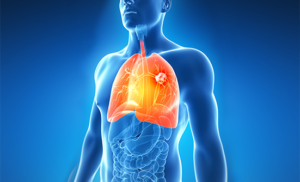The incidence of lung cancer ranked first in cancer, about 46.08 / 10 million, accounting for 19.59% of all malignant tumors, new cases of about 61 million. Lung cancer is also the first cause of death in malignant tumors, accounting for 24.87% of all cancer deaths, about 490,000 cases of death, the mortality rate of 37.00 / 10 million [1] due to lack of early detection of effective means, the majority of patients Is the late, systemic treatment is the main treatment. According to the pathological features of lung cancer, NSCLC can be divided into small cell lung cancer (SCLC) and non-small cell lung cancer (NSCLC). NSCLC can be divided into Squamous lung cancer and non- -sqNSCLC). With the deepening of tumor molecular biology research, advanced lung cancer, especially non-sq NSCLC, in the targeted therapy and immunotherapy has achieved great success, for clinical treatment provides more options to extend the patient’s progression-free Survival (PFS) and overall survival, (OS), improved patient quality of life, (QoL). This article will be combined with recent clinical research on late NSCLC treatment options to do a review.

1 NSCLC first-line treatment
In recent years, a series of driving gene mutations related to tumorigenesis and development have been found. Targeted therapeutic products are targeted by the protein products of these mutated genes. At present, Epithelial growth factor receptor (EGFR) and Echinoderm microtubule-associated protein-like-4-anaplasticlymphomakinase (EML4-ALK) are the most promising therapeutic targets. For patients with advanced non-sqNSCLC, EGFR gene and ALK gene should be routinely detected before treatment, so as to provide the basis for the development of therapeutic regimen. Three cases of NSCLC with EGFR-sensitive mutations, ALK-fusion-gene-positive, and driving-gene-unidentified status are presented.
1.1 EGFR-sensitive mutations NSCLC first-line treatment
NSCLC drive gene research, the earliest discovery of gene mutation target EGFR gene mutation. Compared with the Caucasian population, more East Asian patients can benefit from EGFR mutant gene targeted therapy. The PIONEER study showed that 51.4% of Asian patients with advanced lung adenocarcinoma who had not been selected had EGFR gene-sensitive mutations, whereas only 17% of patients with advanced lung adenocarcinoma in the Western population had EGFR-sensitive mutations [ (EGFR-TKI) has significantly improved the quality of life and overall survival of patients with EGFR-sensitive mutations in NSCLC.Conclusion: EGFR-
In newly diagnosed patients with EGFR-sensitive mutations, the IPASS study showed that PFS and quality of life were better in the first-line gefitinib-treated patients than in the chemotherapy-treated patients. No statistically significant difference was observed in OS between the two groups because of subsequent cross-over. In patients with EGFR-sensitive mutations, PFS was significantly longer in the chemotherapy group than in the gefitinib group.3 The follow-up studies of WJTOG3405, NEJGSG002, OPTIMAL, EURTAC, LUX-Lung3 and LUX-Lung6 demonstrated that EGFR- EGFR-TKI (gefitinib, erlotinib, and alfentanil) is superior to chemotherapy in PFS, quality of life, and tolerability [4-9], suggesting that EGFR-TKI As first-line therapy for advanced lung adenocarcinoma with EGFR-sensitive mutations.
With the new EGFR-TKI continue to develop, EGFR-sensitive mutations in patients with treatment have more choices. The ASCO meeting in 2015 revealed that 60 patients with advanced EGFR mutations (37% exon 19, 40% L858R, 3% other EGFR mutations, and 8% resistant mutant T790M) were included in the AURA study. Mg and 160 mg qd, the objective response rate was 73% and the disease control rate was 97% .There were 13.8 months in the longest remission duration of the patients up to the follow-up data, and 3, 6, 9 Month PFS rates were 93%, 87%, 81%; pending further study in the clinical evaluation.
Leave a Reply